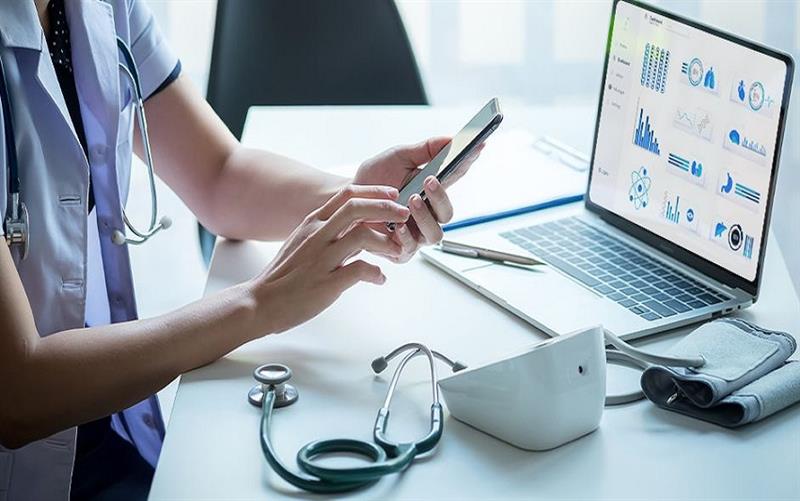
Healthcare software is a strategic enabler that promotes improved patient outcomes, operational effectiveness, and compliance; it is more than just a tool. Investing in strong, cutting-edge software solutions is now essential for success as the medical sector continues to embrace digital change.
Healthcare practitioners may meet the demands of today's fast-paced environment and pave the way for a healthier, more connected future by utilizing the potential of healthcare software.
The healthcare sector is at the nexus of compassion and innovation, and technology is becoming more and more important in enhancing patient outcomes, expediting processes, and guaranteeing regulatory compliance. Healthcare software has become a crucial component in this environment, allowing medical institutions to provide high-quality care while adjusting to contemporary problems.
The following explains why healthcare software is essential to the medical sector's success:
1. Enhancing Patient Care
Fundamentally, healthcare is about giving patients the best treatment possible. Electronic health records (EHR), telemedicine platforms, and patient management systems are examples of advanced healthcare software solutions that enable practitioners to:
- Access Complete Patient Data: EHRs enable medical practitioners to make well-informed decisions rapidly by combining patient history, test data, medications, and imaging into a single system.
- Boost Communication: Real-time communication between patients and doctors is made possible via patient portals and telemedicine capabilities, which increases patient satisfaction and accessibility.
- Customize Treatments: Using patient history, genetics, and lifestyle information, data analytics and AI-powered tools assist in creating individualized treatment regimens.
2. Streamlining Operations
Whether you run a huge hospital or a tiny clinic, running a healthcare facility is quite complex. By streamlining administrative duties, healthcare software frees up providers to concentrate on patient care by:
- Automating Administrative Procedures: Software programs save time and minimize human error in everything from billing and coding to appointment scheduling.
- Optimizing Resource Allocation: Inventory management systems guarantee that necessary medical equipment and supplies are available.
- Cutting Down on Wait Times: Integrated systems facilitate smooth departmental cooperation, which reduces patient care delays.
3. Ensuring Regulatory Compliance
It is imperative to adhere to healthcare legislation, such as GDPR in the EU or HIPAA in the US. The purpose of healthcare software is to:
- Protect Patient Data: Multi-factor authentication and encryption, two cutting-edge security technologies, guard against compromises involving private patient data.
- Simplify Reporting: Integrated tools guarantee conformity to industry standards and assist in producing accurate compliance reports.
- Track and Audit: By keeping track of sensitive data access and modifications, audit trails help companies promote accountability and transparency.
4. Empowering Data-Driven Insights
Every day, the healthcare industry produces enormous volumes of data. This data can be converted into useful insights by software programs with data analytics features:
- Finding patterns in patient health and forecasting epidemics or the course of diseases are two applications of predictive analytics.
- Performance metrics: Assessing operational and clinical effectiveness to pinpoint areas in need of development.
- Cost optimization is the process of examining spending trends in order to cut waste and distribute resources efficiently.
5. Expanding Access to Care
Access to high-quality healthcare is frequently hampered in underserved regions and rural places. This gap is being closed by creative software solutions that:
- Telehealth Services: Patients can obtain medical knowledge without having to travel thanks to virtual consultations.
- Mobile health apps: By placing healthcare in patients' hands, apps offer remote monitoring, medication reminders, and health tracking.
- Remote Patient Monitoring (RPM): Equipment linked to medical software keeps an eye on long-term illnesses and notifies medical professionals of any irregularities.
6. Driving Innovation and Research
Software integration in healthcare is transforming medical innovation and research in the following ways:
- Accelerating Drug Development: To find promising drug candidates and improve clinical trials, AI-driven platforms examine enormous datasets.
- Improving Genomic Studies: By deciphering genetic data, advanced techniques help tailored therapy.
- Promoting Collaboration: Researchers, hospitals, and other organizations around the world may work together easily thanks to cloud-based technologies.
7. Ensuring Scalability and Flexibility
Healthcare software adjusts to new requirements as the medical sector changes:
- Modular Solutions: From tiny clinics to extensive hospital networks, scalable software expands with your company.
- Interoperability: When upgrading or expanding, advanced technologies easily interface with the current infrastructure, guaranteeing a seamless transition.
- Cloud-Based Systems: With the flexibility these solutions enable, healthcare providers can access vital systems from any location.
8. Improving Financial Management
Financial issues that healthcare firms frequently deal with include revenue cycle management, insurance claims, and billing. These procedures are streamlined by healthcare software by:
- Automating billing and claims can speed up insurance payouts and reduce coding errors.
- Finding payment process bottlenecks to maintain steady cash flow is known as revenue cycle management.
- Improving Financial Planning: Cutting-edge analytics technologies aid in spending optimization and budget forecasting.
9. Promoting Patient Engagement
A growing pillar of the medical sector is patient-centric care. In order to promote patient participation, healthcare software is essential because it:
- Providing Educational Resources: Apps and portals provide condition-specific advice, treatment strategies, and individualized health tips.
- Self-monitoring is made possible by wearable technology and linked applications, which enable patients to keep an eye on their health indicators and notify healthcare professionals of any changes.
- Improving Communication: Follow-up reminders and real-time chat capabilities keep patients updated and engaged throughout their care process.
10. Accelerating Emergency Response and Crisis Management
Time is of the essence in emergency situations. By improving crisis management and emergency response, healthcare software can save lives:
- Real-Time Coordination: To speed up care, emergency response systems connect with hospitals, ambulance services, and specialists.
- Disaster Preparedness: Organizations can react quickly and effectively by using tools for monitoring pandemics, natural catastrophes, and epidemics.
- AI-Driven Triage: By using artificial intelligence to rank emergency cases according to their seriousness, the most urgent patients can get care right away.